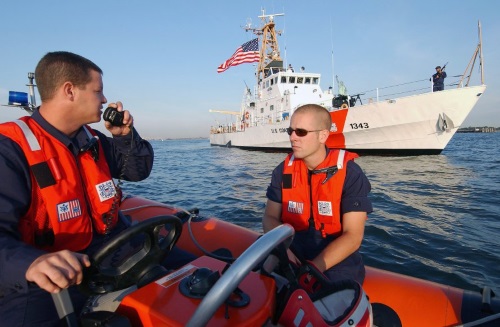The Coast Guard is a specialized branch of the military tasked with the responsibility of protecting the public, environment, and U.S. security and economic interests in the maritime region including international waters and America’s ports, coasts, and inland waterways.
In order to accomplish these missions and many more, this service has more than 40,000 active-duty men and women, 35,000 auxiliary personnel serving in a variety of job fields as well as 8,000 Reservists.
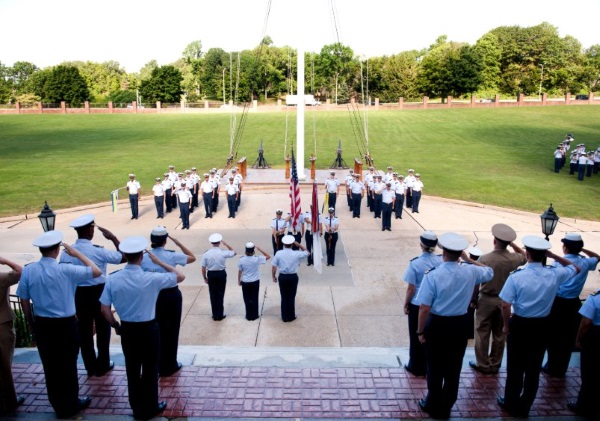
It falls under the newly-created Department of Homeland Defense, but was formerly under the Department of Transportation.
However, the Coast Guard is a military service since, in the event of war, the President of the United States can order the transfer of any or all of the assets owned by Coast Guard to the Navy.
Commanded by the Coast Guard Commandment, who is a 4-star admiral, this unit is tasked to perform the following missions;
- Drugs interdiction
- Ensuring marine safety
- Ensuring port and waterway security
- Search and rescue
- Defense readiness
- Marine environmental protection
- Law enforcement
- Ice operation
- Living marine resource
- Migrant interdiction
- Aiding navigation
On average, based on a 2013 statistic, the Coast Guard will do the following in a day;
- Carry out 109 search and rescue cases
- Protect $2,791,841 worth of property
- Save 10 lives and also assist 192 persons in distress
- Intercept 14 illegal migrants
- Board 144 vessels
- Respond to 20 hazardous chemical or oil spills
- And so much more. Read more about their everyday mission on the GoCoastGuard.com website here.
This service was incepted in 1790 and operated under the name Revenue Marine. This makes it one of the oldest continuous maritime service.
1. Coast Guard Requirements
Special Note: Click Here to read our full article that addresses the full Coast Guard requirements.
The U.S. Coast Guard is a highly selective service that does more with less. This means they have to handpick versatile and hardworking individuals to be able to perform more missions than members of other services.
To become one of the service persons in this unit, there are strict requirements you have to fulfill. Here is a summary of the coast guard requirements;
-
Citizenship
For you to join the Coast Guard, you need to be either a U.S citizen or a resident alien. A person born in the United States is a U.S. citizen, same as U.S. citizen’s children born overseas. Also, if you earned your citizenship through naturalization (passing tests in English and civics), you can qualify as well. On the other hand, a resident alien is a non-citizen who is legally residing in the United States. Those who are permanent residents are often called green card holders, and it is possible to join the Coast Guard as one.
-
Age, Height, Weight, Education, and Dependents
Coast Guard age limit: You must fall between 17-31 if joining for active duty, and 17-40 for reserve duty. However, 17-year-old recruits will require parental consent
Height and weight requirements: To be a member of Coast Guard, you must remain fit by maintaining their MAW (Maximum Allowable Weight). There are specific guidelines for this, click here to read more.
Dependents: They should not exceed three.
Education: You need to have a high school diploma although sometimes they accept GED under special circumstances.
- ASVAB Scores
Assuming you have met all the above requirements, you will now need to take the Armed Services Vocational Aptitude Battery test often called ASVAB test.
To be enlisted, you need to meet the minimum ASVAB score. This test measures your skills to help the Coast Guard determine the tasks you are best suited for.
You also need to pass the basic military medical exam to confirm you are in a good state of health for the service.
-
Basic Physical Fitness
Simply meeting the basic Coast Guard requirements doesn’t mean you are ready for the ‘real’ training.
You will not join the Guard unless you complete eight weeks of basic physical training at Cape May, New Jersey.
You will not graduate unless you pass the Coast Guard’s physical fitness test, or simply PT test.
Here are the physical fitness tests to complete;
- Complete a swim circuit
- Run 1.5 miles under 12:51
- Do 38 sit-ups in less than 60 seconds
- Tread water for 5 minutes
- Jump from a 6 ft. platform and swim 100 meters
- Pass a “sit and reach” test to show your flexibility level
- Complete 29 push ups in less than 60 seconds
However, some of these standards are different for women;
- Finish 15 push ups in 60 seconds
- Complete 32 sit-ups in less than 60 seconds
- The “sit and reach” exercise is slightly tougher
- Run for 1.5 miles in 15:26
- More Training
If you fail to meet the Coast Guard requirements needed for physical fitness at Cape May, your company commander will work with you to enable you to meet them.
The closer you are to meeting the targets, the better your chances of graduating.
During your 8 week stay in Cape May, you will be required to use your brain and strength.
You will receive intense theoretical instruction to equip you with entry-level skills for your role.
Also, you will learn a lot about Coast Guard history, military justice, and military ethics.
Other training you will get include:
- Hands-on training including seamanship
- Small arms training
- Safety and rescue training
- Fire-fighting and damage control.
You will also engage in team-building exercises.
If even after working with your company commander, you fail to meet the physical and academic standards, you will not graduate to join the Coast Guard. You will have to go home and choose a different career path.
Those who complete basic training successfully become E2 guard members, firemen, or seamen. From there, they proceed to their first unit where they are exposed to different career paths available to members of the Coast Guard.
2. Steps to Join the Coast Guard/Sign up process
If you are interested in joining the Coast Guard to save lives and protect the water borders of the U.S. as well as secure the borders, then here are the steps to follow so you can become a Guardian;
Step 1: Gather information about the requirement
The first thing to do before joining the Coast Guard is to determine if it is the right place for you. Research your options and understand what life will be like as a Coast Guard member.
Then, you’ll want to visit a Coast Guard recruiter and ask him or her these questions.
The USCG job involves dealing with highly-sensitive information and national security issues.
You need to meet the requirements we have discussed in the previous subtopic such as passing the ASVAB test, passing a military basic medical exam, passing a criminal record review, and much more.
Step 2- Talk to a coast guard recruiter
After knowing the requirement and the career path to follow, it is time to talk to your recruiter again.
You can find a Coast Guard recruiter near you on the GoCoastGuard.com website here.
Ask them important questions such as:
- How long should one serve in the Coast Guard?
- What does basic training entail?
- How should I prepare for the training?
- What career paths are there in the Coast Guard?
- What are the benefits of joining the Coast Guard as a graduate?
- How is Coast Guard different from other US Armed Forces?
- Can I join college while still in the Coast Guard?
- And other questions you may have
Step 3- Choose a career you want to pursue in the Coast Guard
There are several careers in the Coast Guard including;
- Coast Guard Reserve: In this field, you will be serving for 2 days a month and report to a base near your locality two weeks a year. As a reservist, you will receive valuable benefits including earning extra income and training in different fields.
- Enlisted Guardsman: This allows you to serve in law enforcement, provide air support for the Coast Guard, patrolling waterways, work in environmental operations, and much more.
- Coast guard officer: This suites civilians working in other fields, take charge leaders, or college graduates.
Learn more about the various active-duty careers the Coast Guard has to offer on the GoCoastGuard.com website here.
Step 4: Pass the ASVAB
Armed Services Vocational Aptitude Battery test assesses your skills in general science, mathematical knowledge, word knowledge, numerical operations, auto and shop information, paragraph comprehension, mechanical comprehension, electronic information, and assembling objects.
Step 5: Pass a Background Check
The recruitment process for the Coast Guard is very thorough, and you will have to go through police background check whereby felony convictions will lead to your disqualification. Also, you will go through a credit check to disclose your financial security. A security clearance check will be run since you will be dealing with matters of national security.
Step 6: Pass a personal evaluation test
This is where you meet with your recruiter. They will be evaluating your personal attributes and skills. Consider this as a job interview. Based on your answers, a recruiter will fill out different forms to validate that you are eligible for the service. They normally test professionalism, attitude, respect, honesty, physical abilities, work ethic, and language proficiency.
Step 7: Prepare for Coast Guard Boot Camp
Here, you will be doing basic training to test if you are physically fit and mentally prepared for a transformation. It will take eight weeks. We will talk more about this in our next subtopic.
3. Coast Guard Boot Camp
This is where recruits transform from civilians to Guardsmen. It will be physically and mentally challenging so that you can learn the importance of teamwork and hard work.
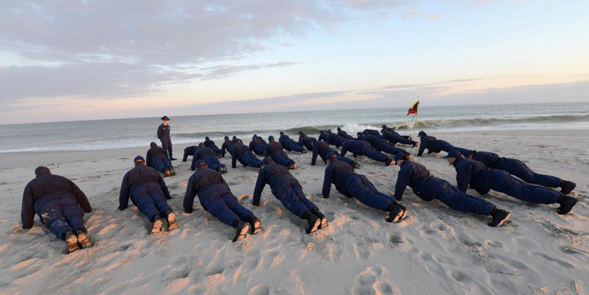
Here is a brief of Coast Guard Boot Camp:
Schedules and Timelines
Boot camp takes 8 weeks where you will learn skills, teamwork spirit, and what it means to live in accordance with the set core values.
The training is challenging and rough, and thus you need to be prepared.
As a Coast Guard, you will be tasked with the responsibility of saving lives and enforcing laws and these tasks require you to be physically and mentally tough.
Here is a breakdown of how the training will be:
Forming
You will arrive in Cape May by bus. After getting there, your hair will be cut, and initial medical screening will be performed.
You will be issued with a uniform, and there will be other administrative tasks that will take place.
This will be your first step towards your transition from a civilian to a Coast Guardsman.
Of course, at the end of the forming stage you will not feel like a military member, but you will begin to act and look like one.
Company formation
After about three days, all of you will become a Recruit Training Company. You will be assigned a company each with a Company Commander.
Your Company Commander (CC) will influence you a lot. He/she will be an instrumental figure in your growth as a Coast Guardsman.
They will teach you respect, honor, and devotion to duty.
Your CC will be demanding and tough and will help you grow in an unimaginable way.
Your first weekend with your company will, of course, be challenging since you will be learning to take and obey orders as well as act as a team member.
This might be the most difficult period of your eight-week stay in the Boot Camp.
The Basics
After forming the company, you will undergo thorough physical fitness training, and you will also be given the required knowledge including military drill, basic classes, and military courtesies and customs.
Related Article – Coast Guard Grooming Standards
Mid-training
This happens at the end of the fourth training week. If you pass the mid-term exam, you will go ahead to fill your ADC or Assignment Data Card.
This tells the Coast Guard where you are suited to serve. You will be assigned a unit or ship depending on the needs to fulfill.
The ADC gives the Coast Guard an idea of where you would like to serve, but this doesn’t mean you will be assigned to your desired unit; the Coast Guard will assign you anywhere your services are needed.
Training at this stage is more hands-on and practical. You will learn line handling, marksmanship, firefighting, and seamanship.
The final phase
At this stage, you are already conducting yourself as a member of the United States Armed Forces. Your training is now purely practical, and you are preparing for graduation.
In the final week of training, you will be taught first aid and CPR.
Frequently Asked Questions about the Coast Guard
4. How hard is it to get in?
To join the Coast Guard, you have to meet all the requirements. You need to have a passion for serving your country.
Some of the requirements include being a U.S. national or a resident alien, be between 17-31 years for active duty Coast Guard or 17-40 for reservists.
You also need to have a high school diploma and not have more than three dependents. There are other requirements as discussed in our earlier section.
5. How hard is boot camp?
The Coast Guard Boot Camp, which last for eight weeks, is one of the toughest boot camps as compared to that of Air Force and Navy.
You need to be physically and mentally prepared since it is tough and rough.
Related Article: 18 Pros And Cons Of Joining The Coast Guard
6. What’s the pay like?
According to the official Coast Guard website, all active-duty coast guard members start out making approximately $20,000 annually.
However, your ultimate salary will depend on your rank and the length of time you’ve served.
Here’s a snapshot of Coast Guard enlisted basic pay rates for 2019:
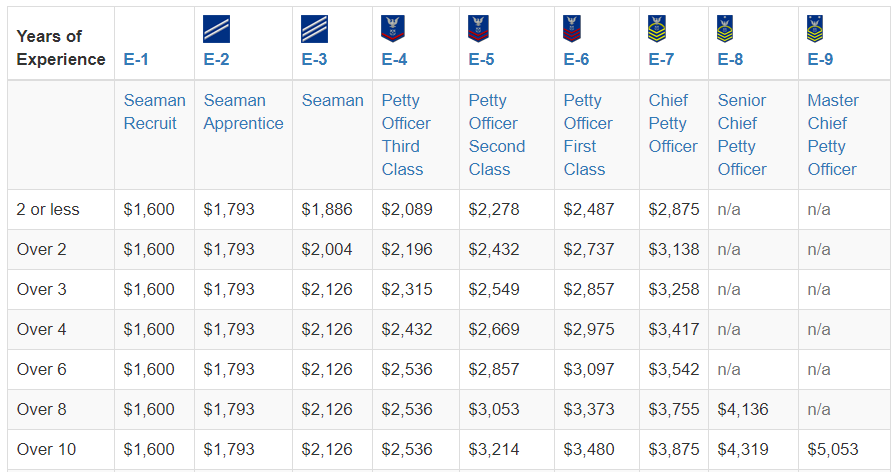
And here’s a snapshot of Coast Guard officer pay rates for 2019:
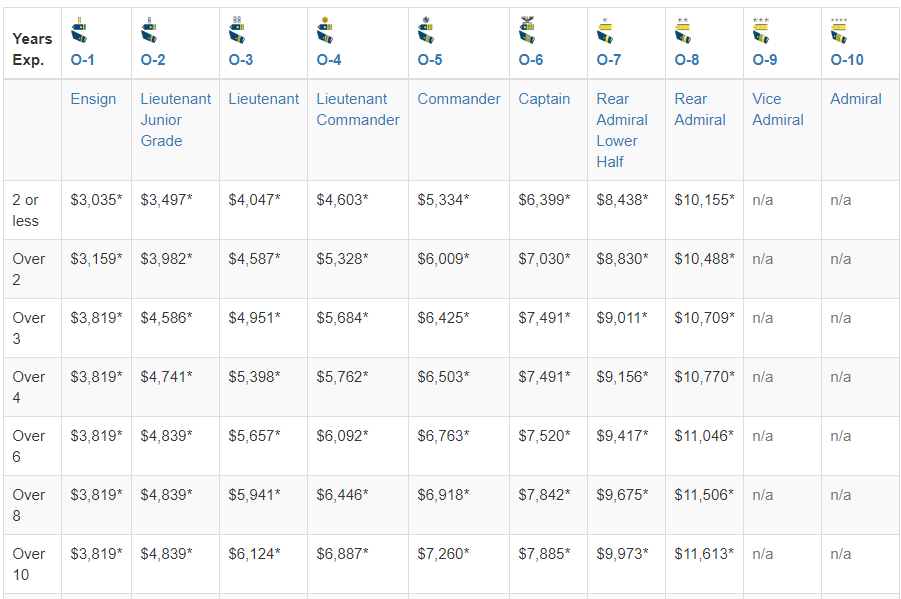
Learn more about the Coast Guard ranks and pay here.
7. Should I become an enlisted member or officer?
Enlisted members have a clear advancement system; they know what they need to do to advance. However, on the part of officers, guarantee for promotions is complicated although promotions from ENS to LTJG is guaranteed.
Both fields have their benefits but being an enlisted member is better if you are looking to advance to a higher level.
If you’re looking to make more money, clearly the officer route is the way to go.
8. What’s a typical day like?
Being a unique force tasked with military and civilian duties, Coast Guard missions touch virtually all facets of maritime interests.
On an average day, the Coast Guard;
- Conducts 45 rescue cases
- Seizes 214 pounds of marijuana and 874 pounds of cocaine
- Saves 10 lives
- Conducts 57 patrols on water bodies
- Interdicts 17 illegal migrates
- Investigates 35 incidents of pollution
- Conducts 105 inspections at the dock
- Completes 26 examinations on foreign vessels
- And much more…
9. Pros and Cons Coast Guard
Pros
- Like other military members, the Coast Guard offers its enlisted personnel and officers a steady pay, significant allowances, and job security
- Members also receive tax-free housing allowance or free government-provided housing and food allowances
- They are offered comprehensive health care
- Ability to select your desired carrier path, although this is limited only by your physical abilities, aptitude, and security clearance
- You get an opportunity to serve your country
Cons
- You cannot choose where you will be posted unless you are a reservist
- The job can be hazardous since Coast Guard involves interdicting drug trafficking, protecting terrorist threats, and interdicting illegal immigration
10. Popular Jobs in the Coast Guard
There are 20 enlisted coast guard jobs, often called ratings divided into 4 major categories;
- Deck and Ordnance: Boatswain’s Mate, Enforcement Specialist, Intelligence Specialist, and Operation Specialist.
- Hull and Engineering: Electrician’s Mate, Damage Control person, Machinery Technician, and Informative System Technician.
- Aviation: Aviation Maintenance Technician, Avionics Electrical Technician, and Aviation Survival Technician
- Administrative and Scientific: Health Services Technician, Food Service Specialist, Musician, Marine Science Technician, Yeoman, Public Affairs Specialist, and Storekeeper.
- Rescue Swimmer: Officially known as an Aviation Survival Technician, rescue swimmers are responsible for rescuing people at sea.
Related Article: 5 Best Coast Guard Jobs
Conclusion
Deciding to join the Coast Guard comes down to your commitment and your passion for serving your country. While members of the Air Force and Army may go to foreign theaters of war to defend the United States, Coast Guard members defend the US within its territories.
Therefore, if you are passionate about serving your nation and feel that you can meet all the requirements needed, the Coast Guard offers a great opportunity for that. We hope that our guide clears all the question you had about joining the Coast Guard.
Resources:
Coast Guard Active Duty Careers
- Coast Guard Grooming Standards - June 17, 2024
- Attending the Naval Academy Preparatory School - June 17, 2024
- Vet Tix Review: Your Go-To Guide - June 17, 2024

